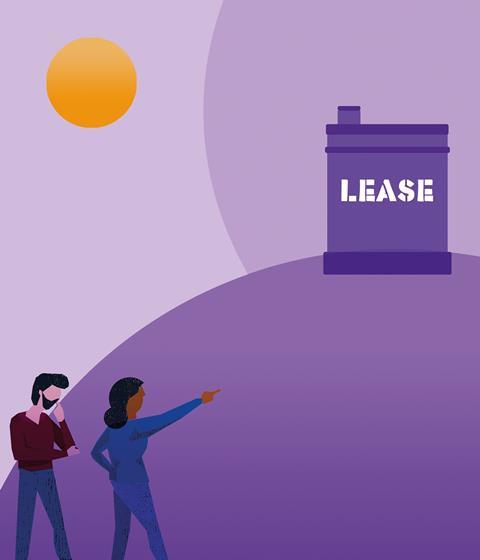As the Leasehold and Freehold Bill 2023–24 wends its way through parliament, Lucy Trevelyan examines what the reforms will mean for the leasehold property market

The new Leasehold and Freehold Bill 2023–24 (currently at report stage in parliament) aims to improve consumer choice and fairness in leasehold, crack down on unfair practices, and take forward recommendations made by the Law Commission in its 2020 leasehold reform reports.
Key provisions
There is a lot in the bill, but key provisions include:
- making it cheaper and easier for leaseholders to extend their lease and buy their freehold
- increasing the standard lease extension term to 990 years
- reducing ground rent to a zero financial value upon payment of a premium, and
- changing the qualifying criteria to give more leaseholders the right to extend their lease, buy their freehold and take over management of their building.
Leaseholders will get a host of new rights, including: improved transparency of service charges, administration charges and buildings insurance commissions; the right to request information about service charges and their building’s management; the right not to face any unjustified legal costs; and the right to claim their own legal costs from their freeholder.
Freehold homeowners who pay charges for the maintenance of communal areas and facilities on a private or mixed-tenure residential estate will be entitled to challenge the reasonableness of charges and the standard of services provided, and the transparency of estate charges and access to key information will be improved for freeholders.
Rentcharge owners, meanwhile, will be barred from taking possession or granting a lease on a freehold property where the rentcharge remains unpaid for only a short time.
Who benefits?
Many see the concept of leaseholds as an outdated system and one ripe for change, says Carrie Foley, associate in Lewis Denley’s commercial property team. “During the Middle Ages, land represented a source of power, compelling influential families to safeguard their land ownership while maximising its economic returns. Leasehold estates emerged a few decades after the Domesday Book of 1086, marking a shift in land tenure. Leaseholds are largely seen as a revenue stream for the freeholder and outdated and unfair to the leaseholder. These reforms will be a welcome change for many.”
Patrick Bullick – managing director of Chelsea estate agency Stanley Property London and former chairman of the National Association of Estate Agents (London region) – is not overly impressed with the bill: “This is half-cock legislation, which is overdoing some elements and largely missing the opportunity to simplify and make the lease extension process easier. If the Lords don’t manage to properly influence it (Commons will not), courts and lawyers will have a field day fighting the theft of value from legitimate landowners.”
He concedes, however, that it may reap some benefits. “It should make transparency to leaseholders better and managing agents and freeholders more accountable, and the transparency required may improve the standards of management of buildings. Hopefully, it will also mean fewer rip-off freeholders and their agents, and, while it will mean more work and complexity for property professionals at first, it may then settle into an easier, if still flawed, process,” he says.
Leaseholders overall should benefit from the bill, particularly in relation to lease extensions becoming more accessible (which then makes the properties that had short lease terms left more marketable) and the cost of ground rent being removed, says Liz Ramsden, senior associate in Knights’ residential property team. She continues: “They will benefit from more regulation and power of enforcement around service charges, too. There are also new regulations coming into force around estate management charges, which will benefit leasehold houses and freehold houses with an estate charge payable, similar to the regulations around service charge. And rent charges are to be more fairly managed, with the power given by the Law of Property Act 1925 section 121 being amended so that notice has to be given upon non-payment of rent before any action can be taken.”

Who loses?
Freeholders, however, will lose out on their investments as the revenue from ground rent is diminished, says Ramsden.
“They will also have an increase in any legal costs for actions brought to them by the leaseholders as the presumption that the leaseholder will pay the freeholder’s legal costs is to be removed. It is also likely that all the new obligations on freeholders / landlords will increase their operating costs.”
The most welcome proposals are possibly that lease extensions will be 990 years rather than 90 years, says Grace Mercer, associate in Thomson Snell & Passmore’s real estate disputes team. “This change will ensure that, once extended, a lease is unlikely to need extending again under the statute. Scrapping the two-year ownership rule to qualify to extend the lease under the Leasehold Reform, Housing and Urban Development Act 1993 (LRHUDA 1993) will also be welcomed. This additional flexibility will benefit leaseholders having purchased a property, as they will not have a diminishing lease length for two years before being able to make a claim.”
Increasing the commercial property element from 25% to 50% of floor area to allow a building to qualify for enfranchisement, with the right to impose leasebacks on freeholders, is another element that will be welcomed by some, she says. “This will enable a larger number of buildings that currently do not fall within the enfranchisement legislation to exercise the right of collective enfranchisement. However, this may cause some concerns for investors / developers who have either bought or designed buildings that are configured in this way.”
The bill is likely to impact the leasehold properties held by larger landowners – specifically, mixed-use premises, says Simon Hartley, partner, and London head of property litigation at Weightmans. “The new rules are likely to lead to an increase in the number of mixed-use properties at risk of enfranchisement. This is likely to make mixed-use developments less attractive as an investment. This may be exacerbated by other elements of the bill, which seek to make it cheaper and easier for leaseholders to buy freeholds, and obtain information regarding service charges and other sums due under their tenancies.”
The fundamental drawback to the legislation is that it prioritises short‑term eye-catching gains to leaseholders over the long-term stability and quality of the leasehold market, says Lauren Fraser, senior associate at Charles Russell Speechlys – with the proposal to allow buildings with 50% non-residential areas (such as shops or restaurants) to become capable of freehold acquisition by leaseholders being a prime example.
“A lot of buildings that form part of high streets, many of which are currently in one ownership (for example, by local authorities), will fall into separate ownership by the leasehold owners of the residential parts of the building. This will lead to the fragmentation of those high streets and undoubtedly the deterioration in the quality of the retail and leisure on offer. The difference between a retail offering under one ownership – where the freeholder can implement a strategy for the management and mix of commercial uses – versus a high street under multiple ownerships can be seen by comparing Regent Street (owned by the Crown Estate) to neighbouring Oxford Street. A lack of a coherent plan has seen Oxford Street blighted by low-quality discount retailers and ‘American Candy’ shops.”
Legal costs
Another change that could have dramatic consequences is the proposal to limit the recovery of legal costs by freeholders from leaseholders, Fraser says. “This proposal involves rewriting the contracts entered into between freeholders and leaseholders – a dramatic step. Again, the long-term impact of this does not appear to have been considered in any detail. The effect of this proposal is that freeholders will, in many cases, be unable to take legal action to recover critical service charge funds from defaulting leaseholders. The constraints on pursuing defaulting leaseholders are likely to leave gaps in the service charge funds, so that critical building maintenance and repairs are not carried out. Long-term disrepair will eventually negatively impact the value of the leasehold properties within the building.”
It will also prevent freeholders from taking action in response to complaints from residents against anti-social behaviour, such as noise nuisance, she adds. “Without the certainty of being able to recover the costs of legal action under the terms of the lease, freeholders are likely to have no option but to leave these sorts of disputes to be resolved between leaseholders.”
Other proposals
The more controversial proposals include capping ground rents, subject to consultation – the preferred option being capping ground rents to a peppercorn, Mercer says. “There is a direct benefit to leaseholders. Conversely, freeholders will see a reduction in ground rent income, which is likely to impact on the value of their asset.”
The abolition of the payment of marriage value will also prove contentious, as will freeholders having to pay their own costs (currently, reasonable costs are recoverable) and bringing estate management charges into the service charge legislation, she adds. “Currently, when estate management charges apply to freehold houses, these do not fall under the service charge legislation and cannot be challenged on grounds of reasonableness in the tribunal, so this change is also likely to be a controversial issue.”
Owners of leases of flats that already have under 80 years unexpired term left on their leases, and those needing to sell with short leases, will be happiest if the bill comes into force, says Birketts’ residential property partner, Nicola Lebish. “The changes will make it cheaper and easier to extend a lease term and to acquire the freehold collectively by removing marriage value. The removal of the two-year ownership requirement to extend a lease of a flat will also facilitate buyers being able to serve a notice to extend their lease straight away, without having to wait two years. This also removes the incentive for landlords to seek to challenge claims and push the valuation date two years into the future in the hope of securing a greater premium.”
Landlords who have invested in ground rent reversions will, however, lose an element of investment value if the payment of marriage value is removed, she warns. “If ground rents in existing leases are removed, then landlords, particularly the large estate and pension fund landlords, will lose a significant income stream – so expect significant challenges. We do not see how, for example, the retrospective removal of ground rents can be implemented without some form of compensation scheme.”
How will this affect the market?
The contents of the bill provide greater clarity about the provisions that are intended to come into force; but, until those provisions become law, there is less to reassure leaseholders and freeholders than might at first appear, says Cordelia Smith, associate in Hunters Law’s property department.
The proposed reforms have already had a knock-on effect on the leasehold market, she says, with leaseholders and freeholders all wanting to ‘wait and see’ since the provisions of the bill were first mooted. “It’s not just the sales market that has been affected by the proposed changes. Many leaseholders who are looking to exercise their statutory right to extend their leases, for example, have been holding back to see whether the bill would bring in provisions more favourable than those currently in place under the Leasehold Reform Act 1967 and LRHUDA 1993.”
The proposed bill will benefit those with the largest, most valuable flats (typically those in central London), says Claire Allan, head of leasehold enfranchisement at Lawrence Stephens. “Many flats in prime central London are not occupied by their owners, however. Instead, a high number of these properties are owned by non-UK investors. If implemented, therefore, the bill would in effect create a massive transfer of wealth to overseas investors.”

Leasehold houses
A glaring omission from the bill, says Foley, is a blanket prohibition on new leasehold houses. “The government has consistently pledged to prohibit the development of new leasehold houses. Although the Leasehold Reform (Ground Rent) Act 2022 and the involvement of the Competition and Markets Authority with housebuilders have partially addressed this concern, the government has acknowledged, with embarrassment, that the draft bill lacks provisions dealing with this issue. There is a commitment to consider amending the bill to address this matter as it advances. Currently, however, there is no outright ban on the creation of new leasehold houses.”
A ban on the creation of new leasehold houses other than in exceptional circumstances would be a welcome move, agrees Trish Randles, a real estate partner at Aaron & Partners – although it remains to be seen what will amount to ‘exceptional circumstances’. “In the past, this has been exploited by some house builders whose only motivation for such schemes is profit – either by the ability to sell on the freehold reversions to investors or to receive the income themselves from the ground rents, and subsequently charge the house buyer a further sum to acquire the freehold at a later date.”
For property lawyers, the reforms will undoubtedly make the leasehold process even more complicated than it already is, with more legislation to consider and advise on, some of it contradicting advice given at any time before the act is passed, says Ramsden. “Property lawyers will have to provide more advice on enfranchisement and the implications under the Building Safety Act 2022, together with the possibility that the owners of the freehold could be opening themselves up to potential criminal prosecution in high-risk buildings, which will surely take away some of the benefit and appeal of enfranchisement. Due to an increase in insurance premiums for leasehold transactions, together with added training and expertise required to navigate the changing landscape, many firms appear to no longer wish to act in leasehold transactions. Accordingly, the cost of leasehold conveyancing is likely to increase for the end user – that is, the leaseholder client.”
The uncertainty, extent and absence of any timeframe for implementation of the reforms is making it extremely difficult to effectively advise leaseholder clients, says Keystone Law’s residential property partner Katie Cohen. “With clients buying shorter leases during the conveyancing process, it remains the case that we must advise our clients to continue the process of extending the lease and commencing the process with the seller serving a section 42 notice and assigning the benefit of that notice to the buyer upon completion. Of course, this may change if the two-year ownership rule is abolished, enabling a leaseholder to exercise a statutory right to a lease extension as soon as they have been registered as the owner at the Land Registry.”
Property lawyers will need to be familiar with the new rules, as will freeholders, surveyors, estate agents and developers of such properties, says Randles. “I would expect both investors and developers to be more wary of mixed‑use properties. Agents may also be less keen to manage these for landlords and there could be a knock-on increase in the cost of managing, which will also have a detrimental effect on potential investors and developers of such properties. In the long term, there will be less work for lawyers and surveyors in dealing with lease extensions (because of the proposal for standard additional term of lease extensions of 990 years).”
There is still a long way to go before the bill advances to the House of Lords for further scrutiny, Mercer says – and this is not expected to be a smooth passage. “The legislation is likely to face significant challenges to include potential claims by landlords, some of whom view the proposals as being contrary to their human rights. The reforms in the final bill could be watered down and it could take even longer to be implemented. With the prospect of a general election (and a possible change of government) there is still huge uncertainty around what the final bill will look like before it becomes law.”
The Labour Party’s pledge to abolish leasehold within its first 100 days of government is a bold move, she adds. “The intention is to replace it with a more transparent and equitable alternative – potentially a commonhold system. This radical change could simplify property ownership, eliminate ground rents and empower leaseholders. But it also poses significant challenges because dispute resolution is much more complicated, as it requires all owners of the freehold to be consulted on decisions.”




















